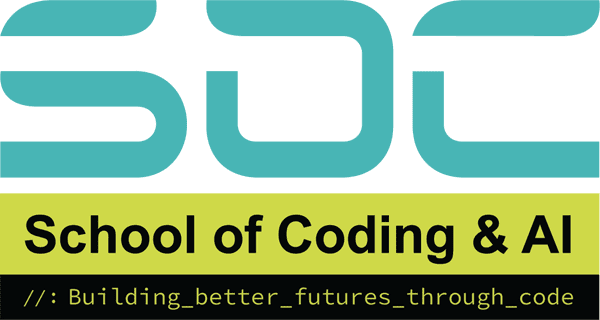BSc (Hons) Computing & Information Technology with Foundation Year
Course Overview
This four-year, full-time programme begins with a supportive Foundation Year, designed for students who may not yet meet standard entry requirements or who wish to build confidence in academic skills before starting their degree.
Delivered at School of Coding & AI in partnership with the University of Wolverhampton, this course equips you with a deep understanding of computing principles, modern IT systems, and cutting-edge technologies — while developing the problem-solving and analytical skills required in this digital era. This course is ideal for:
- Foundation-to-Degree Pathway – A structured route that supports your academic and technical development from day one.
- Industry-Relevant Curriculum – Modules designed to reflect real-world practices, emerging technologies, and future job skills.
- Practical, Hands-On Learning – Opportunities to work on live projects, team collaborations, and your final-year project.
- Flexibility to Specialise – Optional modules let you explore areas like Cloud Computing, Internet of Things (IoT), Human-Computer Interaction, and Image Processing.
| Qualification Title | BSc (Hons) Computing and Information Technology |
| Level | Undergraduate |
| Awarding body | University of Wolverhampton |
| Mode of Study | Full-Time or Part-Time |
| Duration | 4 years for full-time students and 8 years for Part-timers |
| Entry Requirements |
|
| Intakes | September 2025 |
| Campus | Birmingham |
Course Structure & Modules
- Academic Skills & Professional Development
- Introduction to Computing & IT
- Basic Programming and Logic
- Mathematics for Computing
- Team Project & Problem Solving
- Digital Skills for Higher Education
- Computer Architecture & Networks – Understanding how systems and networks operate.
- Introduction to Web Development – Learn HTML, CSS, and JavaScript for creating dynamic websites.
- Database Design & Management – Using SQL to store and manage information.
- Problem Solving & Programming – Develop coding skills using industry-relevant languages.
- Information Systems & Organisations – Explore how IT supports business processes.
- Collaborative Project – Work as part of a team to deliver a technical solution.
- Advanced Web Development – Responsive, interactive websites and apps.
- Networking Technologies – Setting up and managing modern networks.
- Database Systems – Managing large-scale data effectively.
- Human-Computer Interaction (Optional) – Designing user-friendly systems.
- Smart Systems & IoT (Optional) – Embedded technologies and connected devices.
- Image Processing (Optional) – Exploring visual computing techniques.
- Advanced Networks & Databases – Cutting-edge database and network solutions.
- Mobile App Development – Creating apps for Android and iOS.
- Cloud Computing (Optional) – Learn virtualisation, scalability, and cloud platforms.
- Internet of Things (Optional) – Designing and building IoT applications.
- Final Year Project – Research, design, and deliver a major computing solution.
Course Structure & Modules
Year 1
- Module: 3PY002
- Credits: 20
- Period: 1
- Type: Core
The aim of this module is for students to develop and effectively use the necessary range of appropriate skills in reading, study, written and oral communication and research required for their future career development.
- Module: 3MM003
- Credits: 20
- Period: 1
- Type: Core
- Module: 3MM004
- Credits: 20
- Period: 1
- Type: Core
- Module: 3CS001
- Credits: 20
- Period: 1
- Type: Core
- Module: 3PY002
- Credits: 20
- Period: 1
- Type: Core
- Module: 3CC004
- Credits: 20
- Period: 1
- Type: Core
Year 2
- Module: 4CS015
- Credits: 20
- Period: 1
- Type: Core
This module is designed to provide students with an understanding of fundamental computing concepts and allow them to use these effectively and efficiently. The module will allow you to acquire the necessary knowledge and skills for both completing your degree and succeeding at your chosen field of work. It is designed to be both easy to follow for students with little or no knowledge of the computing concepts to be covered but also to provide additional benefits for students that already have previous experience in the field of computing. The topics that are covered include Logic and Boolean algebra, Truth tables, Computer Architecture, Number Systems, Command line management of a computer, Data processing, Digital Communications, Computer Security and Databases.
- Module: 4CC020
- Credits: 20
- Period: 1
- Type: Core
This module introduces students to the fundamentals that underline the design, implementation, control, evaluation, and strategic use of computer-based information systems in an organisational and business context. IT and service activities in a business environment will be addressed to equip students with the skills needed for the effective management of IT/IS issues.
- Module: 4CS020
- Credits: 20
- Period: 1
- Type: Core
This module will enable you to develop skills in the creation of interactive 3D applications and environments. Interactive 3D is the ability to interact and connect with the 3D digital content and worlds in the same way as the real world. For example, architects can visualise and walk through their building designs, doctors can practise surgery, we can see and customise products we are buying, and instructors can simulate a home and educate people about cybersecurity risks within the home. We are now in a world where interactive 3D content is the norm. We all need some understanding of this technology as workers, creators, and customers. We are going to explore the technology that powers interactive 3D content (i.e., game technology) and the skills that are important for the creation of interactive 3D experiences. Through the exploration of interactive 3D applications, you will also develop the academic skills needed to successfully study in higher education. This includes literature searching, academic writing, critical analysis, referencing and working in groups.
- Module: 4CS017
- Credits: 20
- Period: 1
- Type: Core
This module focuses on how modern software applications are built and structured, with an emphasis on understanding how different layers of hardware and software exchange data over the web via HTTP services. You will also be introduced to database concepts and technologies. You will learn to apply them to the development of modern software applications.
- Module: 4CS001
- Credits: 20
- Period: 1
- Type: Core
In this module you will be introduced to the fundamental principles common to modern programming languages so that you are well prepared to learn to write programs in a variety of languages. Principles include: problem solving, algorithm design and construction (sequence, selection, iteration, object and activity diagrams), variables, data types, assignment operators, logic, the fundamentals of object orientation (objects and classes, attributes and methods, encapsulation), programming pragmatics (style, testing, debugging), and simple data structures (arrays and lists).
- Module: 4CS012
- Credits: 20
- Period: 1
- Type: Core
Virtualisation is essential to allow businesses to develop more IT-efficient and flexible servers and systems. This module has been designed for students to gain hands-on experience of server management and virtualisation by deploying, migrating and testing servers in virtual environments. The module focuses on the importance of testing and securing servers and related technologies, alongside learning the role operating systems have in server management. Virtualisation technologies will be used, and Cloud Computing will be introduced in this module through hands-on activities. In this module, you will learn about the basic technologies and features of the more popular server operating systems. You will also learn about the various server functions and services that can be configure on a server and the role of different operating systems. In addition, you will learn how to install, configure and maintain these servers. A significant emphasis will be placed on practical tasks to gain valuable experience and skills required in industry.
Year 3
- Module: 5CS024
- Credits: 20
- Period: 2
- Type: Core
This module integrates the subject material studied in other level 4 and 5 modules and gives students experience of developing a software artefact in a team. Working effectively as part of a team is a key skill in the modern world of software development and IT. You will learn about team roles, collaboration techniques, software development techniques, project management tools and techniques, documentation, the commercial and economic context of development and information security.
- Module: 5CS032
- Credits: 20
- Period: 2
- Type: Core
This is a technically orientated module where you will learn the principles of a modern networked environment, and how this extends to the internet. It is a practical orientated view of networks with many opportunities to set up and configure typical network equipment, such as switches and routers, as used in real networks.
- Module: 5CI022
- Credits: 20
- Period: 2
- Type: Core
This module will provide you with a firm grounding in the principles of Professional Databases. The topics you will study include why databases are important and how to design and manipulate a DBMS. This will involve you looking at database design techniques, different models of data and gaining a firm understanding of the challenges of working within a multi-user database user environment. The module will give you practical experience of using SQL with a modern relational database management system (DBMS). It will focus on the commercial and economic context of database development, the maintenance of databases and the use of the Oracle DBMS.
- Module: 5CS045
- Credits: 20
- Period: 2
- Type: Core
A full stack developer is a person who develops both front end and back-end software. This module introduces you to a range of tools and techniques for full stack web development. The lecture material covers the technologies involved in the production and support of secure, dynamic websites using a server-side scripting language and a database. They also code the design and implementation of a front-end interface. During workshop sessions, you have the opportunity to practice lecture-taught material to develop your own website.
- Module: 5CS048
- Credits: 20
- Period: 2
- Type: Optional
This module explores a range of cloud technologies and culminates in a system being developed for and deployed to cloud infrastructure.
- Module: 5CS018
- Credits: 20
- Period: 2
- Type: Optional
This module provides students with a comprehensive understanding of designing, implementing, and managing secure systems within modern IT environments. It explores core security principles, threat landscapes, and best practices for safeguarding information assets. Key topics include security architecture design, identity and access management (IAM), network communication security, endpoint detection and response, and security operations using appropriate tools. By the end of the module, students will develop the skills to assess vulnerabilities, design robust security solutions, and manage operational security effectively.
- Module: 5CI021
- Credits: 20
- Period: 2
- Type: Optional
This module looks at different data processing and mining techniques and state-of-the-art data processing and mining tools. The topics include: introduction to data mining and knowledge discovery process, data collection and processing with various data types from a variety of sources, social web mining. You will look at a variety of techniques and trends in data mining.
- Module: 5CS031
- Credits: 20
- Period: 2
- Type: Optional
This module aims to provide students with a comprehensive understanding of network security principles, techniques, and applications. Students will learn to identify, assess, and mitigate modern security threats in diverse network environments. By the end of the module, students will be equipped with theoretical knowledge and practical skills to design and implement effective security strategies.
Year 4
- Module: 6CS058
- Credits: 20
- Period: 3
- Type: Core
The module aims to equip you with the advanced skills to design, build and manage appropriate databases and knowledge systems in the active field of database systems and data management. Typical topics include theory of databases; query planning and optimisation; transaction processing and concurrency control; maintenance of data integrity, availability and security; data warehousing and OLAP; semantic knowledge structures (OWL, SPARQL).
- Module: 6CS007
- Credits: 40
- Period: 3
- Type: Core
In this module, you will start by looking at the Professional issues related to working in the Computing and IT industry. You will consider professional conduct and the social, legal and ethical implications related to the profession – in-line with BCS guidelines. In the first semester you will also start to consider the subject of your final year project. Following discussions with staff members you will produce a project proposal document and start a literature review on your chosen topic. You will be assigned a project supervisor who will meet with you at regular intervals to provide you with feedback on your work as it progresses. In your second semester, you will continue to work individually on the main part of your final year project with regular meetings with your supervisor. This supervisor, plus another member of staff, will assess your project.
- Module: 6CS056
- Credits: 20
- Period: 3
- Type: Optional
This module builds on your full-stack development journey from the second year by providing an in-depth understanding of full-stack web application development and emphasising the importance of architectural patterns and Service Oriented Architectures in full-stack Web Development. It also takes a look at current and emerging full-stack web development technologies.
- Module: 6CS029
- Credits: 20
- Period: 3
- Type: Optional
This module will cover the more advanced areas of networks and, in particular, current trends in network design and management. It will have an opportunity to make use of widely used software, commercial network design and performance simulation software.
- Module: 6CS030
- Credits: 20
- Period: 3
- Type: Optional
This module builds on High Performance Computing and Database modules to provide understanding and knowledge of the essential concepts, theories and practices of Big Data. This will include Distributed Systems, the latest advances and techniques in processing and managing big data.
- Module: 6CS013
- Credits: 20
- Period: 3
- Type: Optional
This module is designed to provide the student with an awareness of both current and upcoming trends/developments within the computer science industry. This includes recent technology developments, along with evolving technologies and those currently at a research stage. With this foundation, the student will be able to appraise the viability of future ‘Blue Sky’ technologies, with some consideration towards their impact on Human Computer Interaction.
- Module: 6CS059
- Credits: 20
- Period: 3
- Type: Optional
Intelligent systems are advanced computer system that use artificial intelligence (AI) to perceive and respond to the world around them. The aim of intelligent systems is to automate intelligent behaviours that traditionally only human beings have been able to perform. Intelligent systems can take many forms, such as autonomous vacuum cleaners, robot delivery drones and personalized suggestions on web sites. They can fill many roles in society, such as factory automation, medical care, education, recognition, and transportation. This module provides you with an understanding of intelligent system theory and concepts and an awareness of the issues involved in creating intelligent systems. You will also have the opportunity to develop intelligent systems.
- Module: 6CS032
- Credits: 20
- Period: 3
- Type: Optional
This module will develop an understanding of the risk and threats that may affect IT systems and electronic business through analysing the threats, vulnerability of systems and through selecting appropriate countermeasures to prevent such risks for impacting the confidentiality, integrity and availability (CIA) of data and systems. The module will enable you to use tools and techniques to analyse those risks and evaluate their consequences. You will learn how to apply countermeasures to eliminate those risks and reduce the consequences should an incident occur.
Entry Requirements
We welcome a diverse range of applicants — whether you are a school leaver, a career changer, or someone looking to formalise your IT skills.
Typical requirements:
- UCAS Points: 48–72 UCAS tariff points.
- Level 3 Qualifications: A Levels, BTEC Extended Diploma, or equivalent.
- GCSEs: English and Maths at grade C/4 or above (or equivalent).
- Alternative Routes: Mature students without formal qualifications may be considered based on experience and an interview.
If you do not meet the standard entry criteria, the Foundation Year is an excellent stepping stone.

Benefits
At School of Coding & AI, we are committed to more than just teaching theory – we focus on providing a comprehensive learning experience that prepares you for the demands of the modern tech industry. The SOC Higher Education Advantage includes:
- Foundation Year Advantages: The additional year allows students to adapt to the demands of higher education while building confidence in technical subjects.
- Technical expertise: Gain technical expertise in multiple programming languages, database systems, and network technologies.
- Skill Enhancement: Develop critical thinking and analytical skills valued by employers.
- Hands-on Learning: Learn to adapt to new technologies and work on real-world projects.
- Improved Communication Abilities: Enhance your teamwork, leadership, and communication abilities.
- Career-Oriented Curriculum: School of Coding & AI collaboration with Wolverhampton University ensures access to the latest industry trends and technologies.
Further Career
Graduates can pursue careers in:
- Software Development – The process of designing, coding, testing, and maintaining computer programs or applications to solve specific problems or provide digital services.
- IT Project Management – The practice of planning, organising, and overseeing technology projects to ensure they are delivered on time, within budget, and meet quality standards.
- Web and Mobile App Development – Creating applications that run on websites or mobile devices, providing users with interactive and functional digital experiences.
- Cybersecurity Analysis – Identifying, assessing, and mitigating security risks to protect computer systems, networks, and data from cyber threats.
- Artificial Intelligence Development – Creating AI systems that can perform tasks such as learning, decision-making, and problem-solving, often mimicking human intelligence.

FAQs
Anyone interested in a career in IT or computing, whether you are starting fresh or reskilling for a new career.
You can start with the Foundation Year to gain the skills and confidence needed for the degree.
Through a mix of assignments, practical projects, presentations, and some exams.
Yes, many students work part-time, and our timetable allows for flexible study alongside employment.
Yes — our projects and practical modules are designed with industry partners to simulate real workplace scenarios.

Get in Touch
35 Livery St, Birmingham B3 2PB, United Kingdom
0121 582 4468

